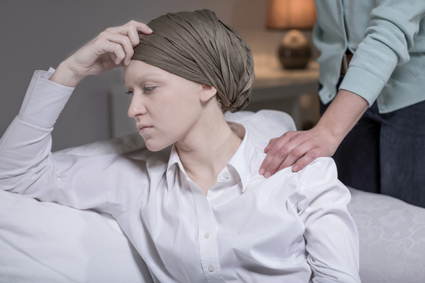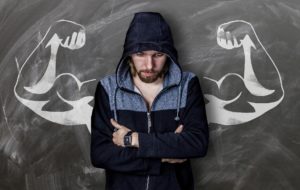Leah Hellerstein, LCSW has worked at the UCSF Helen Diller Family Comprehensive Cancer Center for about three years as an outpatient oncology social worker. She can work with any of the cancer patients who may come through the hospital’s doors. She will soon begin a master’s program in Public Health.
Lucas: We have touched on this a bit already, but what kinds of stressful things or “stressors” do cancer patients face aside from dealing with their disease?
Leah Hellerstein: There are a wide variety of issues someone can face. Finances, insurance, mental health, physical health, etc. Everything that we assess the patient for is a stressor in a way. The heavy hitter, No. 1, I would say, is finances. It is pervasive with all patients we work with. There are always financial issues. Housing, access to medication, copays or even just getting to the hospital if they are coming from far distances. There is always something when it comes to finances.

Credit: family.lovetoknow.com
Lucas: Aside from stressful financial issues, what else can interfere with a patient’s mental well-being during cancer treatment?
Leah: There can be many psycho-social stressors, including mental health issues such as anxiety, depression and other feelings related to dealing with cancer and the adjustments one has to make because of the illness. A fair number of our patients have children, so that can definitely be a stressor as well. We try to help the family cope, educate the children about the illness and support the patient and their children through the process.
Work stressors are always relevant too. If somebody has been working and then they have to stop because of the cancer…that is definitely a stressor. Returning to work after treatment is stressful as well.
Lucas: What about post-treatment stressors? I’m sure both during and after remission cancer patients probably still feel vulnerable.
Leah: Definitely. It can be very stressful to go back into the workforce after you’ve been out of work for however long, even if you were only in treatment for only a couple of months. So is readjusting to life while dealing with side effects such as fatigue.
The whole idea of “survivorship” is really big right now. Patients who are in remission and have no evidence of disease will still worry about whether it will come back. So that is a stressor, always. It’s in the back of their mind. They just don’t know. And so people will make sure they are eating the right foods, exercising and doing all the things to make sure the cancer does not come back.
Lucas: And what about physical stressors?
Leah: Even after the diagnosis and treatment, and you’re “cured,” you can still have a lot of physical symptoms. Fatigue, weakness, shortness of breath, issues with your hair, sleep patterns and even your personal relationships all play into each other as far as physical symptoms go.
Lucas: Of course, individual cancer patients are different, but what are some similarities you’ve noticed across the board as far as issues that patients may have?
Leah: Some of the more common questions I receive have to do with their health insurance. Anything from, “Do you accept my insurance?” to, “What is my copay?” “Does this [insurance] cover this treatment?” “Do I have to pay anything out of pocket?” It’s a big issue that usually leads to a variety of conversations depending on the patient’s status and where they’re at. They could also be Medicare eligible, so that turns into a whole conversation about Medicare, copays and supplements. Or they may be low-income and may only be eligible for Medi-Cal, so I would help them navigate the Medi-Cal system.
Lucas: Do you work with cancer patients in hospice?
Leah: I do not work with people once they go into hospice. We do have a program here at UCSF called the Symptom Management Service and they are the palliative care service here. So, oftentimes they will see patients throughout the course of their treatment even if they are not hospice eligible. They are just seeing them as they approach the end of life, or talking to cancer patients want to have those conversations early on. They have their own social worker. I do some work with them, but they do a lot of work on their own. They will refer out to hospice once the patient is ready.
We do not have our own hospice at UCSF. We usually work with Hospice by the Bay, one of the big names for home hospice here in the Bay Area. We don’t get involved past referring patients there.
Lucas: Why did you decide to get into this kind of work?
Leah: I came into it originally because I was really interested in health care. I didn’t want to do anything super “sciency,” but really like working with people and the health care system. After going to school at Berkeley for social work I did some interesting internships. One was a pretty intense mental health program for patients coming out of the prison system.
I think where I am now just kind of spun into being interested in the medical system as well as working with people. I like the resources and support aspect, but I also like looking at the bigger system, which is where I’m going with my M.P.H. Ultimately, I think there are a lot things we can do better in our health care system, and I’d like to make an impact on the more macro level.
Lucas: When will you start the M.P.H. program?
Leah: It starts in July. It’s actually a very streamlined program meant for people who have a degree in something else, so it’s not your typical M.P.H. program. It’s meant for health care professionals who already have a career and are looking to complement their degree with more macro-level skills. I will be done by May of next year.
Lucas: That’s great! I wish you the best of luck going forward, and thank you so much for taking the time to speak with me!
Leah: It was my pleasure, Lucas. Thank you!
In case you missed it, here is part one of our interview with Leah Hellerstein.

 What Kinds of Stressors Do Cancer Patients Face and How Can A Social Worker Help Ease The Burden?
What Kinds of Stressors Do Cancer Patients Face and How Can A Social Worker Help Ease The Burden?


 “Hand to Earth” by Andy Goldsworthy
“Hand to Earth” by Andy Goldsworthy
 Trans Remembrance Project Provides a Community of Grieving
Trans Remembrance Project Provides a Community of Grieving
 Caring for a Dying Loved One? Be Gentle With Yourself.
Caring for a Dying Loved One? Be Gentle With Yourself.














